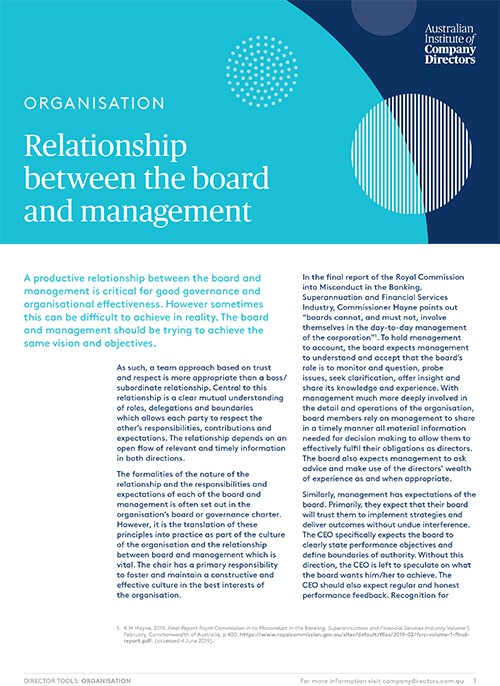
A productive relationship between the board and management is critical for good governance and organisational effectiveness. However sometimes this can be difficult to achieve in reality. The board and management should be trying to achieve the same vision and objectives.
As such, a team approach based on trust and respect is more appropriate than a boss/ subordinate relationship. Central to this relationship is a clear mutual understanding of roles, delegations and boundaries which allows each party to respect the other’s responsibilities, contributions and expectations. The relationship depends on an open flow of relevant and timely information in both directions.
The formalities of the nature of the relationship and the responsibilities and expectations of each of the board and management is often set out in the organisation’s board or governance charter. However, it is the translation of these principles into practice as part of the culture of the organisation and the relationship between board and management which is vital. The chair has a primary responsibility to foster and maintain a constructive and effective culture in the best interests of the organisation.
In the final report of the Royal Commission into Misconduct in the Banking, Superannuation and Financial Services Industry, Commissioner Hayne points out “boards cannot, and must not, involve themselves in the day-to-day management of the corporation”1 . To hold management to account, the board expects management to understand and accept that the board’s role is to monitor and question, probe issues, seek clarification, offer insight and share its knowledge and experience. With management much more deeply involved in the detail and operations of the organisation, board members rely on management to share in a timely manner all material information needed for decision making to allow them to effectively fulfil their obligations as directors. The board also expects management to ask advice and make use of the directors’ wealth of experience as and when appropriate.
Latest Director Tools
Already a member?
Login to view this content

